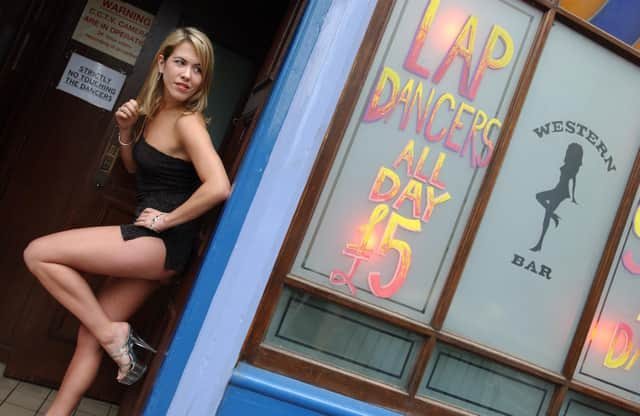Edinburgh lap dancing ban: Sex work degrades every one of us, turning women into the playthings of pathetic men – Susan Dalgety


Aidan O’Neill was in Edinburgh’s Court of Session on Thursday, speaking on behalf of the owners of the capital’s four lap-dancing clubs. The clubs were in court, arguing at a judicial review against the city council’s decision to ban strip clubs from next April. They were joined by the United Sex Workers (USW) union, whose lawyer, David Welsh, insisted that the ban would interfere with the dancers’ rights under the European Convention of Human Rights.
Speaking after the hearing, one lap dancer told a newspaper that a ban would have a detrimental impact on her life. “I’ve got children so leaving the city or having to travelling long distances to work would have a real effect on me. We are fighting to keep our livelihoods during a cost-of-living crisis. I think we have very good arguments in this case.”
Advertisement
Hide AdAdvertisement
Hide AdDavid Lynch told the judge that some women may find themselves in “prostitution territory” if they lose their jobs, adding: “The council are saying if you want to stay in Edinburgh, do a different job. If you want to do the same job, you will have to do that somewhere else.”
Edinburgh City Council’s decision in March, to impose a zero cap on the number of sexual entertainment venues in the city, flies in the face of its previous reputation for being an ‘enlightened’ city when it came to sex work.
I still recall, as a young councillor in the 1990s, approving public entertainment licences for city centre saunas in the full knowledge that they were brothels. Edinburgh was the first city in the UK to effectively decriminalise prostitution, first as an effort to reduce the threat of HIV/ Aids, then latterly because it was the “progressive” thing to do. “Sex work is work” went the mantra, so surely it was only common sense to license brothels so that women could ply their trade in safety.
A 2013 attempt by Police Scotland to close down the saunas failed when it was revealed that there had been a secret deal in 1986 between city councillors, Lothian and Borders police and NHS officials to allow prostitution in saunas, provided the owners supplied condoms and promoted safe sex.
There are still licensed saunas in Edinburgh today which offer “discreet, relaxing” services, promising a warm welcome and a “sweet indulgence” to customers, even those on a tight schedule. And the internet has provided the sex industry with even more retail opportunities, from live sex sessions online to dedicated websites advertising sex for sale in private homes.
So why, nearly four decades after it liberalised prostitution, has the city council decided to crack down on lap dancing? Because the clubs disempower women, argues deputy council leader Mandy Watt. “I believe the ban was the right decision because these clubs disempower women. They are not helpful for the view society has of women and their place in the world. I want to see women being treated with respect.”
She’s right. No matter how you dress up lap-dancing clubs, they are nothing more than living pornography. They may be businesses, as their lawyer said on Thursday, but they are exploitative enterprises whose main offering is not Champagne, but women’s naked bodies for men to salivate over while they get drunk.
“The most charming and loveliest Dollies await the pleasure of your company,” purrs the website of one of the city’s four clubs. Women as nothing more than sexual handmaids, paid to pleasure men, licensed by the city council. Surely this is not what we want for our young women?
Advertisement
Hide AdAdvertisement
Hide AdThe argument at the heart of the judicial review is not about the sex industry per se, but about the right to work in a legal trade, and regardless of the judge’s ruling, it should give us pause for thought. In the four decades since Edinburgh gave the green light to its sex industry, attitudes towards sex have changed, and not necessarily for the better.
Liberal feminists argue that prostitution is legitimate work and an expression of women’s power, dismissing radical feminists – who see sex work as dangerous exploitation – as grumpy old women, out of touch with the modern world.
Sugar dating, where (mostly) young women have a sexual relationship with an older man in exchange for a regular income is seen as an easy way to earn a living. And a recent survey suggests that nearly one quarter (22 per cent) of students had tried using OnlyFans – a social media platform where people perform sexually explicit acts for subscribers – to supplement their income.
Young people are swamped with free porn on their smartphones, violent sexual acts such as choking are regarded as mainstream, and girls are sold the lie that sexually provocative clothes and surgically enhanced bodies are the norm. Be kind, they are told from an early age, even if that means consenting to unreasonable, even dangerous, sexual demands as they get older.
The beautiful young “dollies” who tonight will strip off for hordes of men out enjoying a festive drink may think that they are in control of their bodies, but they are being ruthlessly exploited as much as a young woman offering oral sex in the back streets. They are being used by the pathetic men who pay a few pounds to drool over their naked bodies. By the powerful club owners who make a handsome profit from their sex.
And they are let down by those people who persist in arguing that sex work empowers women, when the reality is that it degrades every one of us, reducing women to nothing more living sex dolls designed for the sexual pleasure of men.
Comments
Want to join the conversation? Please or to comment on this article.